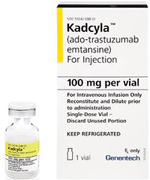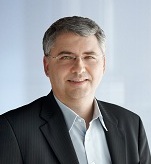Since name-calling didn't get Roche ($RHHBY) the results it wanted with U.K. drug price watchdogs, executives are trying a new tactic: conciliation. The drugmaker has indicated it is open to price negotiations, even money-back guarantees, to win approval of some of its meds.
 Roche is the world's largest maker of cancer drugs and the U.K. is a large market, but England's price regulators have been unwilling to approve some expensive cancer treatments, such as Roche's breast-cancer med Kadcyla, saying their results don't justify their high costs. So Roche has said it is willing to work with the National Health Service (NHS) to prove that they do.
Roche is the world's largest maker of cancer drugs and the U.K. is a large market, but England's price regulators have been unwilling to approve some expensive cancer treatments, such as Roche's breast-cancer med Kadcyla, saying their results don't justify their high costs. So Roche has said it is willing to work with the National Health Service (NHS) to prove that they do.
The drugmaker already is testing money-back guarantees and other payment options in Italy, and Richard Erwin, Roche's U.K. general manager, told Bloomberg the Swiss drugmaker is open to similar approaches in the U.K. The company is looking at rebating some money if patients don't respond to treatment or charging less when patients require expensive cancer meds for long periods. That process could be simplified by technology adopted by the NHS that can track patients and sync payments with progress.
"We think the U.K. can really lead this," Erwin told Bloomberg. "It won't happen quickly but it's something both ourselves and, I think, the NHS are committed to finding solutions on."
The U.K. has a multifaceted method for deciding whether cancer meds will be covered. England created the Cancer Drugs Fund (CDF) after being slammed by patient advocacy groups when it balked at paying for some breakthrough treatments. The fund pays for some drugs not available for coverage for the general population. England has taken so much flack over some of the decisions that it has given control of the fund to cost watchdog NICE, which later this year will review about three dozen cancer meds for inclusion.
 |
| Roche CEO Severin Schwan |
Roche CEO Severin Schwan last year verbally lashed out at the cancer fund administrators when they decided drop Roche's cutting-edge breast cancer treatment Kadcyla, along with more than a dozen other cancer drugs, to rein in costs. "It's stupid from a cost point of view," Schwan said at the time. "How the hell can you ignore all these benefits?"
The fund later agreed to cover Kadcyla in one form of breast cancer but the drugmaker took another hit when NICE refused to cover the drug for the general population, even after Roche offered to discount the drug to £90,000 ($136,000) per patient.
Drugmakers have found England to be one of the least receptive countries to prices of newer cancer meds, but payers in the U.S and some other countries also have been critical of the price tags on some cancer drugs, particularly those considered lifesavers. Italy has put in place a system that payers in the U.S. are also considering: reimbursements that can vary for the same drug with different forms of cancer. A med might be fully refundable in one type of cancer and only partially rebated in another. The American Society of Clinical Oncology recently unveiled a blueprint for evaluating drugs cancer-by-cancer, and Express Scripts ($ESRX) plans to test the approach this year. Roche has been experimenting in France with tracking patient and treatment outcomes as a step toward more performance-based pricing.
While the idea makes sense, the process is not easily administered. It is hard to determine when a med is not working as promised or when patients are undermining results by not being compliant. The U.K. has a few of these deals in place but a government report said it has had trouble collecting on them when it believed rebates were in order.
Still, drugmakers are showing a new willingness to be creative when it comes to getting drugs, and payments, approved. "We are calling for a discussion," Erwin said of Roche's efforts in the U.K. "We are willing to collaborate to find any way to retain access to these medicines in the U.K."
- read the Bloomberg story
Special Report: Top 10 best-selling cancer drugs of 2013